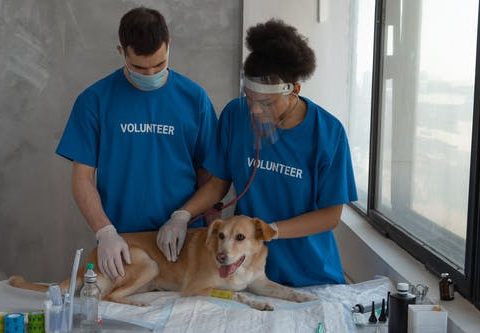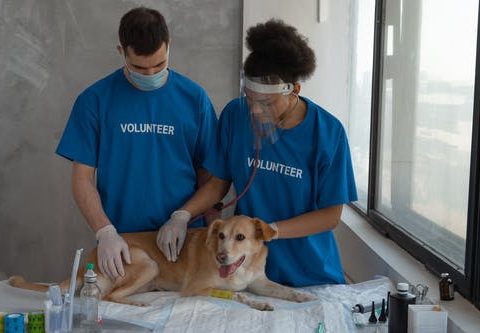From Vaccines to Dental Care: What to Expect from Your Pet’s Veterinary Routine Exam
Your pet’s health is essential, and one of the best ways to ensure their well-being is through regular veterinary routine exams. These checkups are crucial in preventive care and can help detect early signs of illness or injury. In this article, we will cover everything you need to know about routine veterinary exams and some essential aspects of pet care, from vaccines to dental care and everything in between. So, let’s dive into the fascinating world of keeping our furry friends healthy and thriving.
Frequency of Routine Exams
Every pet is different, so the frequency of routine exams will depend on their age, medical history, and specific needs. Generally, there are three categories:
Puppies and Kittens Care
During the first few months of their lives, puppies and kittens require monthly visits to their veterinarian. Their developing immune systems make them more susceptible to illness, so regular checkups are vital for their health and well-being. To ensure proper care, following a trusted website focused on puppies and kittens’ care is essential, which will provide invaluable guidance on vaccination schedules, diet, and more.
Adult Pets and Routine Exams
Adult pets with no history of illness should generally have an annual routine exam. However, suppose your pet has a history of disease or a higher risk of developing certain health conditions. In that case, they may need more frequent checkups. Please consult your veterinarian to determine the best schedule for your furry companion, such as obtaining routine cat and dog exams to maintain their overall health.
Components of a Veterinary Routine Exam
Your pet’s veterinarian will conduct a thorough examination during a routine visit. Here are some critical steps you can expect during a normal veterinary exam.
Review of Pet’s Medical History and Discussion of Concerns
Your veterinarian will start by reviewing your pet’s medical history and discussing any concerns or changes you may have noticed in their behavior, diet, or overall health.
Physical Examination for Pets
The following will typically be included in the physical examination of your pet:
- Eyes inspection for signs of cloudiness, discharge, and swelling
- Evaluation of the pet’s stance, gait, and weight
- Examination of nails and feet for damage or signs of health issues
- Palpation of the body for indications of pain, swelling, or lameness
- Test of ears for wax buildup, polyps, and infections
- Inspection of teeth for damage, decay, and periodontal disease
- Assessment of pet’s coat for abnormal hair loss, dandruff, and overall condition
- Auscultation of lungs and heart
- Abdominal palpation to check internal organs
- Skin examination for parasites, dryness, lumps, and bumps
Veterinary Internal Medicine and Your Pet’s Health
Veterinary internal medicine plays a significant role in preventive care and early detection of health issues. With their expertise, Skyline Animal Clinic vets and other veterinary professionals can diagnose and treat various medical conditions, such as endocrine disorders, gastrointestinal diseases, and respiratory issues. Veterinary internal medicine ensures that your pet receives comprehensive care and the best possible treatment to lead a happy, healthy life.
Annual Vaccinations for Pets
One of the critical aspects of a routine exam is administering annual vaccinations. By staying up-to-date on your pet’s vaccine schedule, you’ll protect them from various contagious diseases and keep them in optimal health. Work closely with your veterinarian to determine the best vaccination plan for your pet based on their age, lifestyle, and risk factors.
Wellness Testing for Pets
In addition to the physical exam, your veterinarian might recommend additional wellness testing, such as:
- Thyroid hormone testing
- Urinalysis
- Complete Blood Count (CBC)
These tests can help detect early signs of illness, even before symptoms appear, allowing for prompt treatment and a more favorable prognosis. More advanced diagnostic tests, including X-rays, might be necessary for senior pets and giant breed dogs.
Lifestyle and Preventive Care
To ensure your pet stays healthy and happy, it is essential to focus on lifestyle and preventive care, such as:
- Providing a balanced diet and ensuring they get adequate exercise
- Prioritizing pet oral health with regular dental checkups and home maintenance
- Employing parasite prevention measures to keep fleas, ticks, and heartworms at bay
Senior Pet Care
The needs of senior pets change, and they may require more frequent veterinary exams and specialized care. Monitoring age-related health conditions, adjusting their diet and exercise routines, and modifying preventive measures can significantly improve the quality of life for your aging pet.
Giant Breed Dogs’ Special Care
Giant breed dogs have unique healthcare needs due to their size and specific health risks. More frequent monitoring, diagnostic testing, and tailoring their diet and exercise requirements are essential to keeping them healthy.
The Role of Veterinary Internal Medicine in Early Detection and Treatment
Routine exams and veterinary internal medicine are crucial in identifying early signs of illness or injury and providing prompt intervention. If any issues are found during the exam, your veterinarian will discuss the diagnosis, treatment options, and next steps, ensuring your pet receives the necessary care.
Conclusion
Veterinary routine exams are essential in maintaining your pet’s overall health and well-being. By working closely with your veterinarian and focusing on preventive care, you’ll ensure your pet lives a long, happy life by your side. Whether it’s vaccines, dental care, or simply understanding your pet’s unique needs, staying informed and proactive is the key to a healthy bond with your furry friend.








